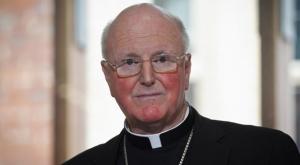The story of United Methodism has gotten boring.
We all have a story. Sometimes these stories are pretty mundane; a series of small crisis and achievements. But when a major crisis appears these stories take on greater urgency. They become the arc that helps us understand the present moment of crisis. They tell us how we got to decision point that will be the defining event in the life of the person, society, or nation.
But while United Methodists are in a crisis, our story has gotten stale.
One version of that story is the one that drives Evangelical identity well beyond Methodism, and forms Evangelical identity in the English speaking realms of the United States, Canada, and England. It is neatly summarized by J.I. Packer (Canada) and quoted in James Heidinger’s (American) new book Theological Liberalism and the Decline of American Methodism. But it could be John Stott (England) or Billy Graham (American) speaking. “Liberalism swept away entirely the gospel of the supernatural redemption of sinners . . . It reduced grace to nature, divine revelation to human reflection, faith in Christ to following His example, and receiving new life to turning over a new leaf.”
Thus Evangelicals see themselves caught up in a story of defending authentic “supernatural” Christianity, in the case of Methodists Wesleyan Christianity. They have faced a series of mounting crisis posed by liberalism. The earliest was the perceived attack by Schleiermacher and his successors on revelation. Then as that perspective took hold there would emerge the specific attack on the authority of scripture. The social gospel would seek to wrest fidelity to Christ from acts of personal and communal righteousness and turn them into political acts and ultimately a liberationist ideology completely abstracted from the supernatural intervention of God’s Spirit. Finally, and this precipitates the ultimate crisis, there would come an attack on the very order of God’s creation by the acceptance of homosexual sexual relations as valid, and even the basis of marriage.
At first this story appears to be one of fascinating complexity and challenge, because at every step the antagonist wasn’t merely liberalism and its proponents, but the tectonic shifting of North Atlantic culture as it entered into and passed beyond the Enlightenment. Evangelicals found themselves defending God’s house from enemies within and without in the midst of an earthquake.
Unfortunately they’ve been telling this story for more than a century and its getting to be like great uncle Bob who uses every family reunion to tell how if it weren’t for him your mom and dad would never have met. Got it. Can we say a prayer and start eating?
The main alternative narrative is that of the antagonist in the Evangelical story: Progressives (the term “liberal” having fallen from use). But in the Progressive narrative the Enlightenment itself is what precipitates a crisis for Christianity. Liberalism, inaugurated by Schleiermacher’s Speeches on Religion to its Cultured Despisers and its successors is Christianity’s brilliant comeback.
The Progressive story: Recognizing that a copernican revolution in culture was taking place liberal theology freed Christianity from its Babylonian captivity to an indefensibly ignorant worldview. It swept away as irrelevant belief in a physical universe consisting of a flat earth sandwiched between hell and heaven with the sun and stars rotating in their 7 realms. It recognized the universality of God’s revelation by locating its most basic form not in books and prophets but in the human longing for God. And by accepting the rapidly developing scientific tools of literary and cultural analysis it put the interpretation of scripture, or revelation proper, on a properly scientific footing that can be taken seriously by modern people. It challenged the cultured despisers of religion and triumphed.
Of course this story isn’t without a struggle and its own crisis moments. The forces of religious authoritarianism, ignorance, and fear of change (read fundamentalism and its successors) fight back. They develop their own scholars to defend the textus receptus, they shore up the theological coherence of evangelicalism by showing how the Bible authorizes itself. Science is attacked, taken to court, and denigrated in defense of the Bible.
And don’t imagine that the story is simplistic. If Evangelicals fight back, they also fall back. Gradually they cease defending a literalist reading of those parts of the Bible that contradict modern science. They eventually accept Biblical criticism but then use its tools to defend the redoubt position that the Bible is “inerrant in all matters of which it properly speaks.” They re-appropriate the church fathers and the creeds and with Barth and others develop more systematic and coherent theology.
So the battle isn’t easy for progressives.
Moreover in America the Bible maintains its numinous quality, resisting all efforts to demythologize its central supernatural assertions, and thus to finally locate the experience of a transcendent God entirely in the immanent frame of secularism. Moreover, and here we come to the current crisis in the narrative of Progressives, large numbers of American Christians continue to believe that God orders human society according to a Divine plan laid down in scripture. They don’t accept, at least not when it challenges the traditional family, that human decisions based on emerging scientific accounts of what it means to be human trump the apparently clear word of scripture. The struggle over same-sex marriage becomes the touchstone of this final conflict.
But wow, like the Evangelical story the Progressive story is getting old. What was once the shaking of foundations is now just stomping on the floor. And that doesn’t make a good story.
So Evangelicals see the crisis precipitated over gay marriage as one of defending God’s supernatural ordering power, and more deeply the entire concept of God’s continued direct intervention in the world of history. Progressives see this crisis as the last chance to sweep away to vestiges of ignorance and bigotry endemic in a pre-modern worldview.
Neither narrative has any real historical merit. They are too neat, too theological to be reflective of what is actually happening in either American society at large or American United Methodism. And thus they are incredibly boring. They are narratives about competing ideas, when the really good stories are stories of complex human characters faced by crisis whose ultimate outcome cannot be guessed because humans are constantly involved in a process of self-discovery. The story of Jesus is compelling. The story of substitutionary atonement or process metaphysics is a yawner.
And that is the other problem. The crisis doesn’t really exist. When one side claims to represent unchanging orthodoxy and the other claims it is on the right side of history they have each announced that they are boring, boring, boring. This crisis, monumental as both sides make it out to be, isn’t going to change them because they’ve announced that they will not change.
When we see that there is no possibility of change, transformation, and discovery we realize that there is no crisis and thus no real story. The actors are shouting, but they stand of different stages doing exactly what they’ve always done. Its like French cinema.
And that is the real crisis faced by American United Methodism: it has become boring. Other Christians are fighting demons, death, poverty, violence, terrorism, and oppression. They live in crisis that demand decisive choices every day. Their true character and identity as Christian is being constantly tested. And thus they are evolving, becoming something new, deep, rich, and interesting.
American Methodists claim a crisis, but in fact we made our choices about who we are more than a century ago and have no intention of changing.
It doesn’t have to be this way. I know we can’t live in the same house; too much drama and too little drive. And what is more boring that waiting for the executor to read the will and divide the property.
Yet we do agree that the poor need to be fed, the naked clothed, the sick healed, the grieving comforted, demons be cast out, God be worshiped and God’s grace and love be proclaimed. Its hard to say what challenges will arise as we undertake those tasks, but certainly the inevitable crisis of facing down the enemies of God’s Reign instead of one another will be what reveals who we really are, and makes our story once again compelling.











